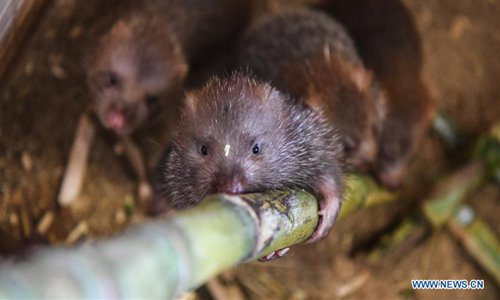
Photo taken on July 24, 2019 shows bamboo rats bred by Lin Jinghong in Qinzhou City, south China's Guangxi Zhuang Autonomous Region. (Xinhua/Zhang Ailin)
Chinese authorities will require farmers to stop breeding 45 kinds of wild animals — including bamboo rats, masked palm civets and porcupines — by the end of 2020, according to a notice released recently by the country's Forestry and Grassland Administration, to manage wild animal breeding and guide breeders to shift their business based on two categories.
Breeding for food purposes will be banned for both categories. For the 45 species mentioned in the notice, belonging to the category one, only breeding for the purpose of species protection is allowed. Breeders of such wild animals need to prove the feasibility and go through relevant procedures.
For another 19 species, in category two, such as hedgehogs, guinea pigs, blue peacocks and cobras, breeding for non-eating purposes will be allowed, which includes medicinal use, display, and scientific research.
The authorities will require local forestry and grassland departments to guide farmers to stop artificial breeding and finish their disposal by the end of this year.
The categorization will serve as a relatively concrete and practical guidance that local authorities can rely on to help breeders leave wild animal breeding, as the breeders are worried about the future of this industry and the great economic loss they may suffer from the ban on wild animal consumption, Li Bo, an animal protection expert and head of the wildlife conservation center in South China's Hainan Province, told the Global Times on Friday.
Notably, the two categories do not include aquatic wild animals. Terrestrial wild animals bred to be used as pets are also not listed.
Li said that such rules can be applied to more areas like pet raising and making of animal specimens that also harm wild animal resources. He also hopes it could encourage relevant authorities to formulate rules and measures for aquatic animal protection, which are also in a serious situation.
"The traditional culture of eating wild animals has to be changed," Li said. He said that eating wild animals won't help to improve people's health although many assume it does. Instead it poses a great risk to public sanitation, as some plants he visited were using a lot of antibiotics for the animals, some animals have serious health problems and there is no effective official supervision or quarantine inspection for the animals.
A nationwide campaign to ban the consumption of wild animals kicked off in China since the COVID-19 pandemic. Following the decision by China's legislative body, released on February 24, to ban the consumption of wild animals and illegal wildlife trade in an all-round way, the forestry authority required on February 27 to withdraw and cancel licenses issued for terrestrial wild animal breeding for food purposes.
As of August 26, 25 provinces in China have launched compensation plans to encourage farmers to shift from wild animal breeding to other businesses.
